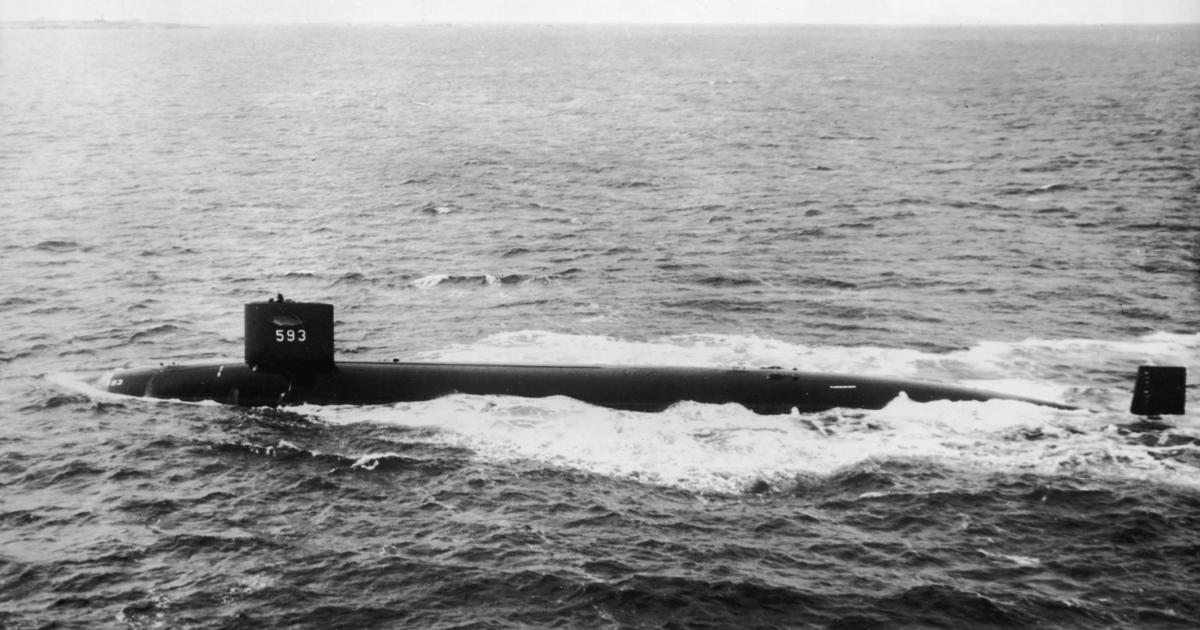The Navy began releasing documents from the investigation into the deadliest submarine disaster in U.S. history this week, revealing that the ship’s commanding officer noted a “dangerous condition” on the vessel before it was lost. The first of the documents released were 300 pages from the official inquiry into the sinking of the USS Thresher in 1963.
The loss of the nuclear-powered submarine and all 129 men aboard during a test dive in the Atlantic Ocean delivered a blow to national pride during the Cold War and became the impetus for safety improvements.
Yellowed newspapers from April of 1963 declare the tragedy of the USS Thresher. Photographed Tuesday, March 26, 2013.
/ Getty Images
“The loss of Thresher was a defining event for the submarine service,” said Rear Adm. William Houston, director of the undersea warfare division in the office of the chief of naval operations at the Pentagon.
The documents noted that the commanding officer’s evaluation of the first year of operations – before additional work was conducted — included praise for the submarine. But he also said the submarine was overly complex in many areas and he noted a vulnerability of the auxiliary salt water system.
“He stated, ‘In my opinion, the most dangerous condition that exists in Thresher is the danger of salt water flooding while at or near test depth,'” the report said.
On April 10, 1963, the Thresher had undergone sea trials and was back in the ocean for deep-dive testing about 220 miles off Massachusetts’ Cape Cod. The first sign of trouble was a garbled message about a “minor difficulty” after the 279-foot submarine descended to more than 800 feet.
The crew indicated it was attempting to empty ballast tanks in an effort to surface. The crew of an accompanying rescue ship heard something about the “test depth.” Then the sailors listened as the sub disintegrated under the crushing pressure of the sea.
Underwater photograph shows a portion of the sunken nuclear-powered submarine ‘USS Thresher,’ September 1963.
/ Getty Images
The Navy inquiry found weaknesses in the design and construction of the first-in-class nuclear-powered submarine, which had been built at Portsmouth Naval Shipyard in Kittery, Maine, and based in Groton, Connecticut.
On March 4, 1964, nearly a year after the disaster, CBS aired a segment on the Thresher, which was reported by Dan Rather. “All the events of that morning may never be known,” Rather said. “Complete answers as to why they happened may never come.”
The Legacy of the Thresher – 1964 Dan Rather CBS SUBSAFE USS Thresher 41280 HD
YouTube
by on YouTube
The documents released Wednesday included the timeline of the sinking, evidence lists, reports, testimony and correspondence. But there were some redactions. Even more than 50 years later, technical details including the test depth were redacted.
In the documents, the Navy said it believes an interior pipe burst and caused electrical problems that caused an emergency shutdown of the nuclear reactor.
The brazed joints in pipes were a special concern, and many electrical panels were not adequately protected from sea water in the event of a leak, the report said.
Resting on the ocean floor at a depth of 8,500 feet, the Thresher looks as though it went through a “shredding machine” and is spread out over a mile, University of Rhode Island oceanographer Robert Ballard told The Associated Press in 2013. Ballard used his 1985 discovery of the RMS Titanic as a Cold War cover for surveying the Thresher.
Not everyone was satisfied with the Navy’s conclusions.
Retired Capt. James Bryant, commander of a Thresher-class submarine, requested the documents under the federal Freedom of Information Act and ultimately went to court to demand the documents’ release. He thinks there’s more to be learned from the documents, most of them classified.
Michael Shafer, whose father and uncle both died on the Thresher, said some of the families need to review the documents to see for themselves and fully understand what happened. His suspicion is that the Navy was pushing the limits and placing personnel at risk during the Cold War.
“I want to know the truth, the whole truth. Not some smoke screen from the Navy,” he said Wednesday from St. Petersburg, Florida.
Nuclear-powered submarine the ‘USS Thresher’ steers through the sea, early 1960s. The sub sank in April of 1963, killing the entire crew.
/ Getty Images
A judge in February ordered the Navy to release the documents. The coronavirus pandemic delayed the review of the documents. Eventually, more than 1,000 pages of documents will be released.
If there was a silver lining, it was that the tragedy so shook the Navy that it accelerated safety improvements and created a program called SUBSAFE, an extensive series of design modifications, training and other improvements.
One submarine has sunk since then, the USS Scorpion in 1968, and it was not SUBSAFE-certified, the Navy said.
Some of the improvements included better welding techniques, and the main ballast tank blow system that helps a submarine reach the surface was made more effective.
Joy MacMillan, one of four siblings who lost their father, the submarine’s chief radioman, said it’s helpful to know the tragedy spurred safety improvements. But it’s still important for the families to have the documents, and some closure.
“After being 57 years in the dark, it’s time for the families to know any and all information so that we can put it away,” MacMillan said.
A 2019 dedication of a new memorial at Arlington Memorial cemetery to the officers and crew of the USS Thresher, a nuclear submarine that sank in 1963, in Arlington, VA.
Photo by Bill O’Leary/The Washington Post via Getty Images
